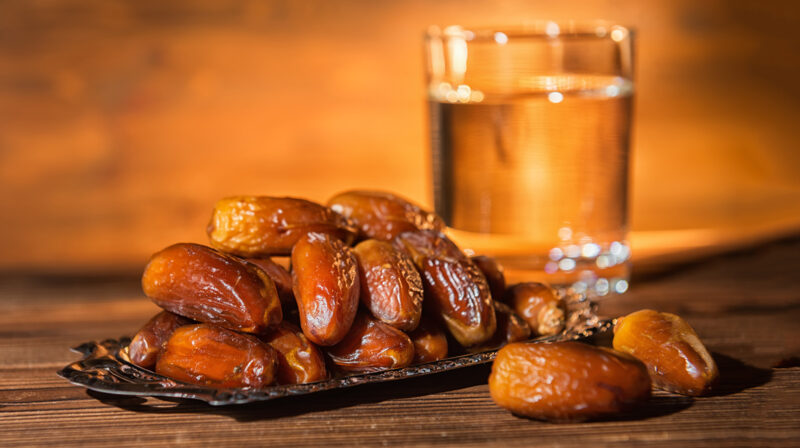6 Tips for Your Strength Training During Ramadan
This article is verified by 7 studies/publications.

Every year, Muslims around the world fast daily for the entire month of Ramadan. They abstain from eating and drinking from dawn to sunset, participating in a unique form of intermittent fasting.
Since the Islamic calendar is based on the lunar cycle, Ramadan moves ahead by about 11 days each year. This means that the fasting month eventually covers every season, resulting in slightly different daily fasting durations each year. In the summer months, for example, fasting can last up to 18 hours in certain locations. The individual fasting period can be even longer, depending on when and if the pre-dawn meal, “Suhûr,” is consumed.
Naturally, many Muslim strength and endurance athletes wonder how to maintain their training during this time. Here are some tips on how to maintain muscle during Ramadan and the factors to consider.
Too long; didn’t read (Summary)
- During Ramadan, you can still do strength training, which is beneficial, but there are some things to consider.
- Instead of focusing on building new muscles, it’s best to aim for maintaining your current muscle mass.
- You can keep training, but it’s recommended that you lower the intensity by lifting lighter weights, reducing the number of repetitions, and taking longer breaks between sets.
- It’s best to exercise after sunset, once you’ve had a chance to drink water and quench your thirst.
- Make sure to pay attention to your protein intake to maintain your muscle mass.
- Try to get enough sleep as insufficient sleep can lead to a decrease in muscle mass.
Adjust your training goals
The keyword here is: muscle maintenance.
During Ramadan, it’s important to modify your training goals. You shouldn’t aim for muscle building for now, as that requires more time to train, sleep, and eat – all of which are usually limited during Ramadan. Additionally, breaking the fast typically occurs with family and friends and may take longer than quickly downing a shake.
Research has shown that a short-term calorie deficit reduces muscle protein synthesis[1]. So, your ability to build muscle mass is somewhat limited.
Your training goal during Ramadan should be muscle maintenance. Be aware that further muscle building will be on hold during the four-week fasting period. Focus on maintaining the muscle you’ve already developed.
Don’t be alarmed if you can’t fully achieve this goal. It’s possible that your training weight in various exercises might decrease during the fasting period. There’s no need to panic – you’ll recover the loss after Ramadan.
Continue training and adjust your training plan
You might wonder why you should train at all during this time if your muscle mass might still decrease.
Experience shows that strength declines even more during a four-week fasting break if you stop training completely. What’s more, some athletes lose motivation or get frustrated with their lost muscle mass and don’t return to training.
The best way to stay in your training routine is to keep training. However, you’ll need to adapt your training plan during this time.
It’s sensible to reduce the intensity. This means using lighter weights, cutting back on training volume, and taking longer rest periods between sets. The main goal is to provide enough training stimulus without overexerting yourself.
Work out later in the day

Train better after sunset.
Many Ramadan muscle-building guides suggest timing your workouts to end right at iftar so you can exercise and then immediately drink water or a protein shake.
While this approach saves time after iftar, it’s not the best idea for your energy and hydration levels. Even if you’re no longer thirsty by day’s end, strength training without enough fluids can cause problems (see next point).
It’s smarter to shift your workout to later in the day when possible. Don’t hit the gym on a full stomach right after iftar, but with renewed energy and adequate water, you’ll train more easily, effectively, and healthily.
Stay hydrated
It’s obvious, but it bears repeating: Drink enough water.
The German Society for Nutrition recommends adults drink around 1.4 liters of water daily[2]. Other sources suggest 2 to 3 liters daily, but most experts agree on at least 1 liter.

You can’t do without water.
In any case, it’s crucial to drink enough water between sunset and dawn, especially if you’re exercising and sweating. You need to meet your hydration needs.
Proper hydration matters for both health and training. Various studies[3] show dehydration negatively impacts strength training performance.
Even mild dehydration quickly affects training performance, with one study reporting 1 to 2 fewer reps per exercise[4]. However, perceived exertion was still higher for hydrated athletes.
In short, training while dehydrated is neither advisable nor beneficial. So, shift your strength training to after iftar and avoid scheduling it to end right at iftar (see previous tip).
Meet your protein needs

A protein shake after training can help meet your daily needs.
Meeting your protein needs is as important as staying hydrated. As noted earlier, muscle protein synthesis is reduced by short-term calorie restriction.
However, there’s another side to this process: After such a phase, muscle protein synthesis can increase again through strength training and protein intake[5].
The combination of strength training and protein intake helps maintain muscle mass. Keep this in mind during Ramadan. A post-workout protein shake can be helpful.
Get enough sleep
Now for the hardest recommendation to follow: Get enough sleep. It’s well known that muscles regenerate and grow during rest and sleep.
A 2010 study found that calorie restriction and sleep deficiency led to more muscle mass loss[6]. Another 2018 study showed that even one night of sleep deprivation promotes muscle breakdown[7].
Getting enough sleep during Ramadan is especially challenging in the summer months. The sun sets late and dawn begins early. In such a time, it’s nearly impossible to maintain a perfect sleep schedule. Nevertheless, try to find a balance that allows you to get a reasonable amount of sleep. If that’s not possible, a short 20-minute nap can help boost your performance.
Summary: Adapt and keep training
Strength training during Ramadan is undoubtedly challenging. Continuing to train as if you weren’t fasting is nearly impossible. So, be aware of this fact in advance.
The tips mentioned above will help you focus on what’s important during the fasting month. However, it’s also clear that not all points can be perfectly balanced. Getting enough to eat, drink, sleep, and train in a particularly short period of time in the summer isn’t entirely possible without some sacrifices.
So, maybe your sleep will be shorter than it should be, or training might not happen because it doesn’t fit into your schedule. For most Muslim strength athletes during Ramadan, there’s no way around it. But it’s crucial to try to maintain your routine during Ramadan, even if it’s in an adapted form. If you can’t make it to the gym, switch to bodyweight exercises like push-ups or squats without additional weight. A small training stimulus is better than none.
Sources
- Acute Energy Deprivation Affects Skeletal Muscle Protein Synthesis and Associated Intracellular Signaling Proteins in Physically Active Adults. Stefan M. Pasiakos, Lisa M. Vislocky, John W. Carbone, Nicholas Altieri, Karen Konopelski, Hedley C. Freake, Jeffrey M. Anderson, Arny A. Ferrando, Robert R. Wolfe, Nancy R. Rodriguez. 2010. The Journal of Nutrition, Volume 140, Issue 4, April 2010, Pages 745–751, https://doi.org/10.3945/jn.109.118372
- Wasser. Deutsche Gesellschaft für Ernährung e. V. 2010. URL: https://www.dge.de/wissenschaft/referenzwerte/wasser/, accessed 21.11.2021
- Effect of hydration state on strength, power, and resistance exercise performance. Judelson DA, Maresh CM, Farrell MJ, Yamamoto LM, Armstrong LE, Kraemer WJ, Volek JS, Spiering BA, Casa DJ, Anderson JM. Med Sci Sports Exerc. 2007 Oct;39(10):1817-24. doi: 10.1249/mss.0b013e3180de5f22. PMID: 17909410.
- Impact of dehydration on a full body resistance exercise protocol. Kraft JA, Green JM, Bishop PA, Richardson MT, Neggers YH, Leeper JD. Eur J Appl Physiol. 2010 May;109(2):259-67. doi: 10.1007/s00421-009-1348-3. Epub 2010 Jan 12. PMID: 20066432.
- Reduced resting skeletal muscle protein synthesis is rescued by resistance exercise and protein ingestion following short-term energy deficit. Areta JL, Burke LM, Camera DM, West DW, Crawshay S, Moore DR, Stellingwerff T, Phillips SM, Hawley JA, Coffey VG. 2014. Am J Physiol Endocrinol Metab. 2014 Apr 15;306(8):E989-97. doi: 10.1152/ajpendo.00590.2013. Epub 2014 Mar 4. PMID: 24595305.
- Insufficient sleep undermines dietary efforts to reduce adiposity. Nedeltcheva AV, Kilkus JM, Imperial J, Schoeller DA, Penev PD. Ann Intern Med. 2010 Oct 5;153(7):435-41. doi: 10.7326/0003-4819-153-7-201010050-00006. PMID: 20921542; PMCID: PMC2951287.
- Acute sleep loss results in tissue-specific alterations in genome-wide DNA methylation state and metabolic fuel utilization in humans. Cedernaes J, Schönke M, Westholm JO, Mi J, Chibalin A, Voisin S, Osler M, Vogel H, Hörnaeus K, Dickson SL, Lind SB, Bergquist J, Schiöth HB, Zierath JR, Benedict C. Sci Adv. 2018 Aug 22;4(8):eaar8590. doi: 10.1126/sciadv.aar8590. PMID: 30140739; PMCID: PMC6105229.